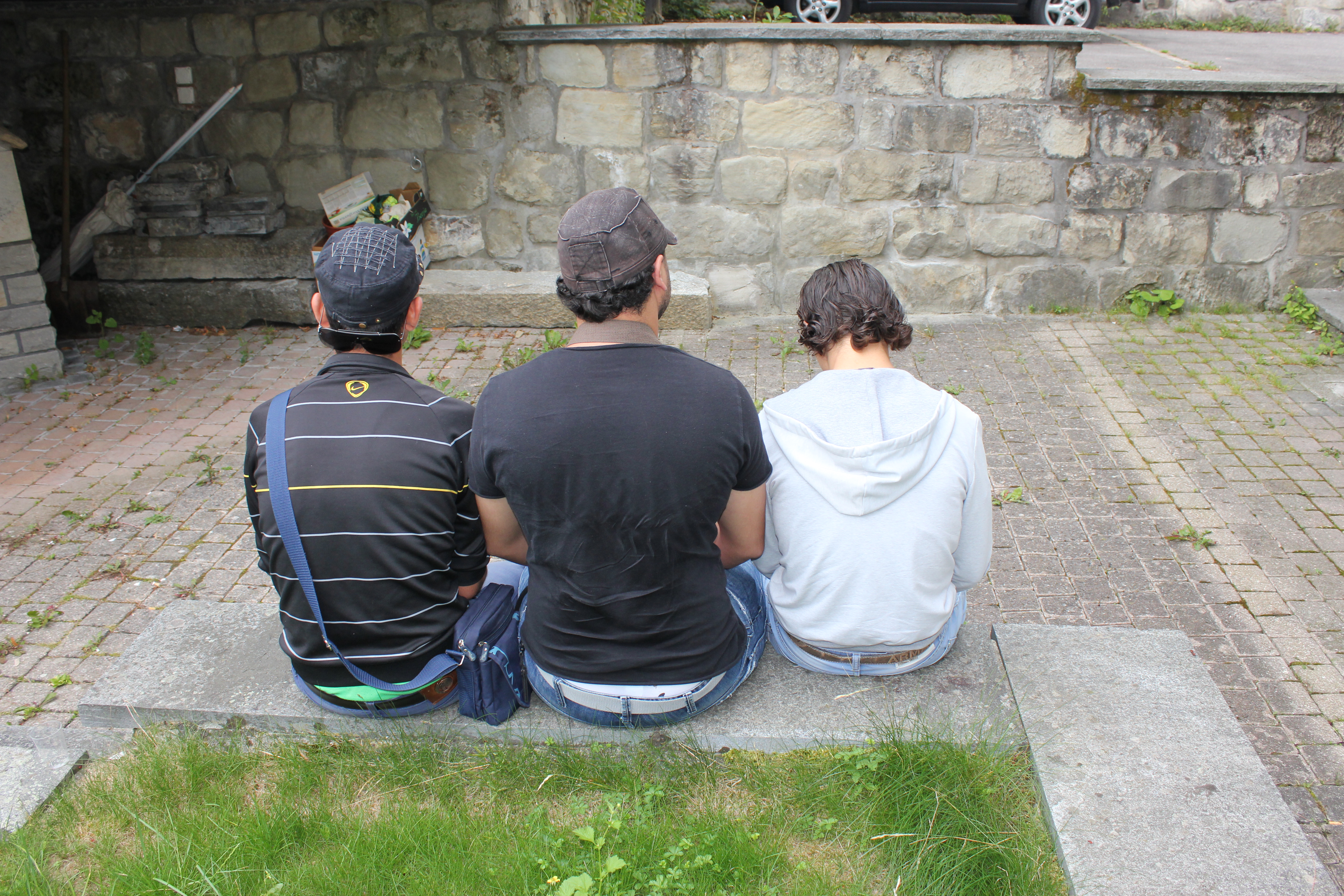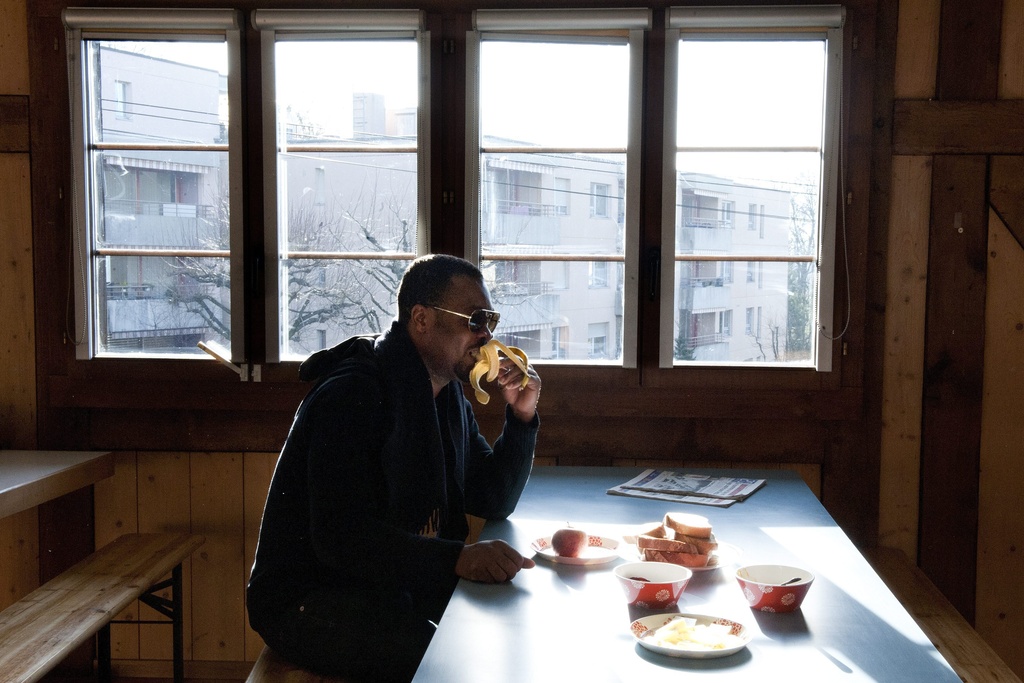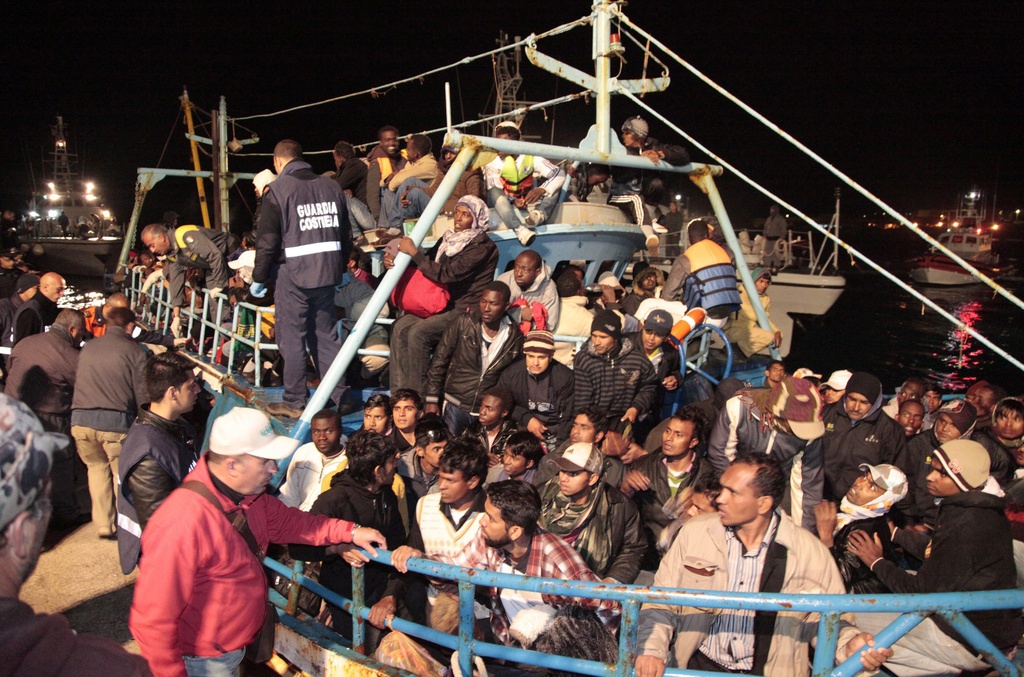Tunisian immigrants cling to hope

Of the thousands of young Tunisians who fled to Europe in the hope of a better life after the fall of the old government, some have ended up in Switzerland.
But even if they are keen to work and have professional qualifications, their future is anything but certain.
Crouching under a table, Estelle Konté-Karlen, a counsellor at the Boveresses day centre in Lausanne, tries to get the wonky internet connection to work. A dozen or so immigrants, all men, most of them young, watch her efforts.
They include three Tunisians – Mehdi, Sahbi and Tarek – all of them in their early twenties.
With nothing else to do, they kill time by surfing the web. And try to make contacts that could help lead them to a better future in this exile where things now are looking worse and worse.
They all say the same thing: “We want to find work to improve our situation and that of our families in Tunisia”.
But without any real idea of where to go, and no money, the experience of the last three months in fortress Europe has been that of one disappointment after the other.
One-way ticket
Mehdi is a qualified industrial maintenance mechanic, and used to have a job for nine months of the year with a Swiss sailboard manufacturer in Douz, on the edge of the Sahara. His monthly salary was SFr200 ($236).
“It’s not enough for a decent life in Tunisia,” he told swissinfo.ch.
So when the regime of Zine el-Abidine Ben Ali fell to popular pressure on January 14, and the borders suddenly opened, Mehdi – along with 20,000 others – seized his chance. For 2,000 dinars, or about SFr1,300, he bought a one-way ticket in a rickety boat for Lampedusa.
In Italy he was given a temporary residence permit. But knowing no one and without a job, he was forced to sleep rough, so decided to move on.
He was thrown out of France after only two days, and sent back to Italy. He decided to try something else.
Bad memories of France
One evening he happened to see a television report about Tunisian immigrants arriving in the Swiss canton of Ticino, which borders on Italy.
“Some Tunisians told me that Switzerland was a good place, the only one you might get asylum,” he explained.
On May 23 he presented himself at the registration centre in the Swiss border town of Chiasso, and started an application for asylum. This entitled him to an N permit, giving him the right to remain while his application is processed. He was then transferred to Lausanne, where he can do nothing but wait.
As an economic immigrant, Mehdi knows he has practically no chance of being granted asylum in Switzerland. But he is not ready to give up. “Whatever happens, I don’t want to go back to Tunisia!” he said.
Sahbi does not want to contemplate going back either.
“Things haven’t improved since the fall of Ben Ali,” he said. “I’ve nothing left there. My mobile phone repair business was ransacked after the January riots.”
Sahbi and Tarek both had bad experiences in France.
They say there is a lot of racism and police checks there, whereas in Switzerland it’s much easier to walk around freely.
Tensions
Nevertheless, even if they feel less harassed in Switzerland, they are under strain.
“I am young, fit and ready to work for any salary. Doing nothing all day long is stressful and making me ill,” said Sahbi.
The combination of enforced leisure with over-crowding and racial tension can lead to problems. The cantonal authorities responsible for asylum seekers, in particular those in eastern Switzerland and Ticino, recently gave voice to their anger with the federal authorities, asking them to speed up procedures and to expel “economic refugees” more quickly.
Konté-Karlen does not deny that with alcohol and group dynamics playing a role, things can get out of hand.
“But as a whole, these are educated young men with solid values. And they are very concerned about their reputation, particularly in the media,” she told swissinfo.ch
Jalel Matri, who owns a billiard hall in the Pâquis district of Geneva where many Tunisians live, agrees.
“Most of them are young men from poor families in southern Tunisia, an area which suffered economic neglect under Ben Ali. They left to see what they can find in Europe. They have had a strict upbringing, and are not the kind to get involved in petty crime.”
“No other choice”
The myth of the Swiss paradise does not last long in the face of reality.
“They soon realise that the cost of living in Switzerland is high and that it’s hard to find work. Most of them move on to France, where they have better contacts and there are more opportunities to work illegally,” Matri explained.
He is certain that the situation will return to normal in a few months.
“Not only are there fewer people trying to leave, but more and more of them are going home,” he said.
Mehdi, Sahbi and Tarek have lost many of the illusions they had when they set out, but still have the energy born of despair.
“We are waiting to be able to seize our opportunity. In any case, we have no other choice.”
From January to May 2011, 8,120 people applied for asylum in Switzerland.
In May alone, there were 2,254 requests – 51% more than in April.
Most of the 2011 applications were filed by Eritreans (1,645), followed by Tunisians (758).
The Swiss justice ministry has said that Switzerland could offer protection to refugees fleeing the fighting in Libya but that Tunisian economic refugees would be sent home.
While there has been in increase in refugees in recent months, the figures are nowhere near as high as in 1999 during conflicts in the Balkans and Sri Lanka.
As of May 2011, 38,000 people were in Switzerland seeking asylum. The 1999 figure was 104,000.
At the end of 2010 there were 43.7 million displaced people worldwide, up from 43.3 million in 2009, according to the UN High Commissioner for Refugees (UNHCR).
Of these, 15.4 million had fled to other countries – 80 per cent of them to nearby developing countries.
Another 27.5 million were internally displaced – i.e. Within their own country.
Asylum seekers who have lodged claims account for another 850,000.
Slightly more than half of all refugees are children under 18.
The largest group of refugees are Afghans (3 million), many of whom left their homeland many years ago.
There were 1.6 million refugees in Europe, down by 40,700 the year before.
There were about 4 million in Asia, 2.1 million in Africa, nearly 7 million in the middle east and north Africa, and 800,000 in the Americas.
(Translated from French by Julia Slater)

In compliance with the JTI standards
More: SWI swissinfo.ch certified by the Journalism Trust Initiative













You can find an overview of ongoing debates with our journalists here . Please join us!
If you want to start a conversation about a topic raised in this article or want to report factual errors, email us at english@swissinfo.ch.